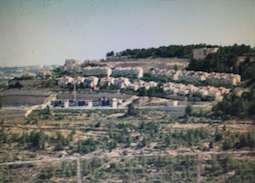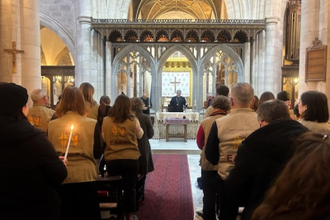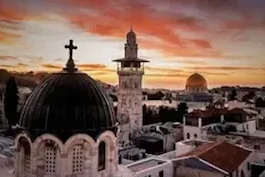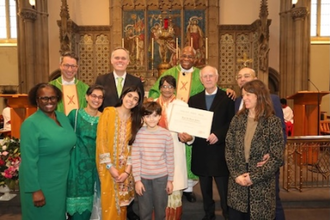Holy Land reflection: 'Two too many!'

From Cremisan Valley in Bethlehem, Har Gilo settlement is expanding
Joseph Hazboun, Regional Director for Palestine and Israel for the Pontifical Mission, Jerusalem, writes:
In our tiny piece of land, we watch as two leaders have put their agendas onto unpleasant paths. Netanyahu, with his expansion, annexation, and oppression plans, is leading the region into riot and chaos while Trump with his bullying attitude, is leading the whole world towards war. However, politics is not our business, people's wellbeing are.
Although the whole world is drastically affected by Covid-19, we cannot permit ourselves to overlook the fact that the Palestinian people continue to face two threats simultaneously, the Covid-19 pandemic and Israel's occupation. Palestinians suffer two kinds of blockades: the self- imposed lockdown to contain and control the spread of the virus, and of course the Israeli occupation, which includes the ongoing blockade on Gaza and the siege on the Palestinian territories.
These are indeed too many "twos" for a weak and staggered Palestinian economy, deprived of its resources and any meaningful prospects to survive, expand, and prosper.
Jerusalem
It is "business as usual'' for the Israeli military and police forces in Jerusalem: handing out fines to Palestinians for not putting on a mask, harassing children and youth in the streets, raiding the Palestinian neighbourhoods to arrest "wanted youth", delivering demolition orders, incursions in the West Bank to apprehend wanted people, and lately announcing the plan to expel around 200 business owners in the Wadi Al-Joz historic industrial zone to establish a Hi-Tech compound that will serve mostly Israelis. Of course, shooting "suspected" Palestinian Jerusalemite youth also continues; the last victim was an autistic young man, Iyad Hallac, aged 32, who was on his way to a special needs school when he was killed.
Covid-19
The reduction in severe cases and infected people in May, encouraged the Israeli Authorities to re- open the schools, especially the kindergartens and younger-aged pupils, with the aim of enabling their parents to return to work. However, it proved to be a bad decision as the number of infections began to rise again and cases have spread among teachers as well as students resulting in the closure of over 90 schools and kindergartens so far. Summer is nearly here which means social gatherings like parties, weddings, graduation celebrations, etc. If these are permitted and if people neglect hygiene requirements, then a worse second wave becomes a reality.
Gaza
It looks like the situation in Gaza continues to be under control although the number of infected people has reached 70. The rise in the number of COVD-19 cases - according to local informants, was due to the return of officials' family members studying in Egypt and were spared isolation yet later diagnosed with the virus. In addition, there is a lack of clean water in Gaza, pollution in both the ground aquifer and the coast, as well as unsanitary conditions within the overcrowded neighborhoods and refugee camps. We hope and pray that the pandemic will not spread throughout the Gaza Strip. As it is, the situation continues to be extremely miserable due to the above reasons in addition to already high unemployment and poverty rates as well as the ongoing border blockade.
PMP recently concluded the installation of several green energy solar panel projects at the YMCA and at Al-Ahli Arab Hospital in Gaza. At the hospital, this was the third phase which helped it reduce fuel and electricity costs (specifically over $70,000 per year). PMP will be examining the possibility of providing the hospital's diagnostic center with same system that will further reduce fuel and electricity expenses and enable the hospital to function during power outages.
PMP provided small grants to train youth and build upon their leadership skills and language skills. In addition, the PMP has also helped entrepreneurs start their own small businesses despite the many challenges that they face. In addition, PMP continues with its ongoing grant to cover medical expenses to the poor and elderly through the Al- Ahli Arab Hospital as well as a small grant to provide medicine for the elderly and the poor through the Catholic Church in Gaza.
From the Cremisan Valley in Bethlehem Governorate, the Har Gilo settlement is expanding.
Bethlehem
PMP held several meetings in the Bethlehem area with the parish priests of Beit Jala and Beit Sahour, Fr. Hanna Salem and Fr. Issa Hijazine; with the General Director of the Chamber of Commerce, Dr. Samir Hazboun, and Mr. Khader Kokally, prominent member of the community in Beit Sahour and chairman of the Board of the Shepherds' Field Hospital.
Cremisan
After the lockdown in Bethlehem was lifted, our first visit was to the Salesian Sisters School in Cremisan where we met with Sr Saadeh. As part of a small grant to support five schools in the Bethlehem area, PMP provided partial funding to help the school cover the teachers' salaries as there was no income from school fees during the lockdown. Usually, local schools collect over 50% of the school fees between March and May each year. Our discussions with Sr. Saadah also involved exploring the possibility of reinvesting in the lands of the congregation that would provide new work opportunities for the unemployed as well as a stable income to help the Sisters continue their mission to educate the poor and needy students. Other ideas explored during the visit included food production and ecological projects.
On Wednesday, 3 June 2020, the Israeli police blocked the road leading to the Salesian male and female religious convents that prevented clergy, workers, and employees from entering or exiting the area. Although this is seen as part of the retaliatory procedures against the PA's decision to freeze all agreements with the Israeli government, the police wanted 24-hour access into the monastery's property, something which the congregation refused since it is private property. This week, a meeting will take place between the Church and the Israeli officials to reach an agreement.
Emergency support to families that lost their income was provided through various parties including the three parishes and scout troop of Beit Jala, Bethlehem, and Beit Sahour, as well as the Shepherds' Field Hospital, the John Paul II Foundation and the Chamber of Commerce.
The situation in general looks bleak, with the latest announcement of annexing the Jordan Valley. It was also reported that the Israeli authorities have reduced water to Bethlehem, from 6,000 cubic meters to 1,500 cubic meters. Our discussions in Beit Sahour considered the possibility of encouraging local small size agricultural initiatives however, the reduction of water to the governorate shifted our discussions towards the need to rehabilitate rainwater cisterns which can help families and institutions cope with the increasing water scarcity.
Ideas were exchanged with the Chamber of Commerce that revolved around sustainable employment, especially targeting unemployed university graduates. Before COVID-19, Bethlehem had a 22% unemployment rate, mostly among young graduates, however today that percentage has doubled. The main market is innovative technologies, IT, and communications which seems to be on the horizon. We agreed that a brain storming session is needed among key players to come up with creative and innovative employment concepts.
Of course, the tourism sector is shutdown, at least until December 2020. This has put olive wood workshops and workers in the trade out of work. In addition, local hotels and souvenir shops are shuttered, with hundreds of employees out of work.
We are considering some initiatives that might be beneficial for the benefactors as well as the local olive wood factories revolving around Christmas trees and decorations.
Conclusion
The local challenges, the situation worldwide, and the pandemic can easily drive us all into despair and/or panic. However, keeping our eyes fixed on the source of hope, Our Lord who promised that He will not leave us alone, and entrusted us with the mission of caring for our brothers, is the one who continues to guide us and protect us in these difficult times. Although the tunnel seems too long, however we are certain that light will soon shine at the end of the road.
Our Vice President, Mgr Peter Vaccari, shared with us a reflection from Pentecost this week about the Lord's "breath" onto the Apostles giving the Holy Ghost. During these difficult times of hardship and despair, we must keep this "breath" spreading, by accompanying our partners, being by their side, and whispering in the ear the words of hope.
We offer gratitude and appreciation to PMP's partner donors and benefactors, who make all of this possible!


















